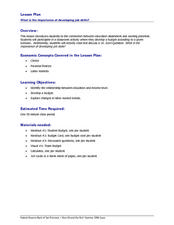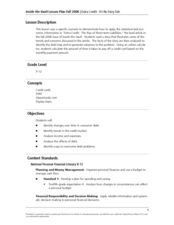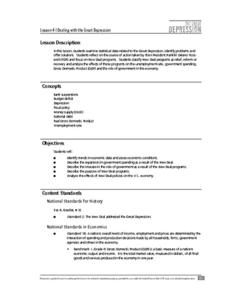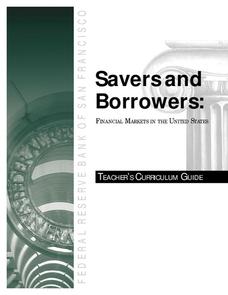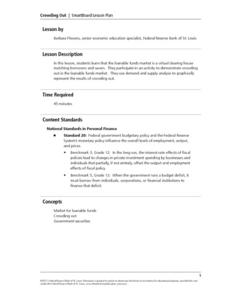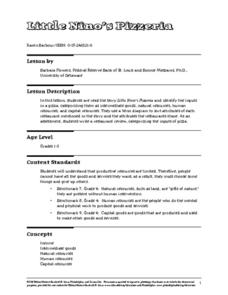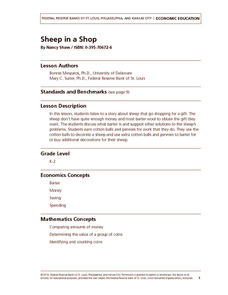Curated OER
What is the Importance of Developing Job Skills?
Financial literacy is the way to teach! The class works in small groups to discover the relationship between education and income level. They use their math and problem-solving skills to complete two different activities. They work out a...
Curated OER
Extra Credit: It’s No Fairy Tale
Young scholars discuss their knowledge of payday loans and credit cards. In this Economics lesson, students complete a read an article and Q&A activity in groups, and play a vocabulary bingo game and a quiz game on payday loans....
Federal Reserve Bank
Money and Inflation: A Functional Relationship
What is the difference between money and bartering, and how is money valued when considering inflation? Delve into the correlation between these fundamental components of economics with this detailed resource, which consists of reading...
Federal Reserve Bank
GDP: Does It Measure Up?
Here is resource that offers a very clear explanation for how economists measure economic growth by comparing real GDP over time. There is also an additional worksheet that details the expenditure method and four components for...
Federal Reserve Bank
Gini in a Bottle: Some Facts on Income Inequality
Delve into the hard numbers and fundamental concept of income inequality in the United States, using graphs, detailed reading materials, and an organized activity.
Federal Reserve Bank
The Rising Cost of College: Tuition, Financial Aid, and Price Discrimination
Are average college tuition and fees really rising in the United States? Here is a fascinating take on the rising cost of college tuition and how price discrimination may explain what is often seen as an insurmountable cost for higher...
Federal Reserve Bank
Dealing with the Great Depression
As part of their study of the Great Depression, young economists examine statistical data to determine the effectiveness of FDR's New Deal recovery programs.
Federal Reserve Bank
Creditors’ Criteria and Borrowers’ Rights and Responsibilities
Discover what criteria creditors use for making loans (the 3 Cs of Credit), and impress upon your young adults the rights and responsibilities related to using credit. Pupils role play as individuals seeking or providing credit, as well...
Federal Reserve Bank
Invest in Yourself
What are the different ways that people can invest in their human capital for a better future? Pupils participate in an engaging hands-on activity and analyze data regarding unemployment, the ability to obtain an education, and median...
Federal Reserve Bank
Cash the Check and Track the Dough
From checking and savings accounts to learning the importance of maintaining records and balancing a bank account, prepare your learners to become financially independent and savvy adults, and explore all the intricacies of owning a bank...
Federal Reserve Bank
Your Budget Plan
What do Whoosh and Jet Stream have in common? They are both characters in a fantastic game designed to help students identify various positive and negative spending behaviors. Through an engaging activity, worksheets, and discussion,...
Federal Reserve Bank
Credit Reports—and You Thought Your Report Card Was Important
Get the facts about credit and take a close look at what factors into a consumer credit report with this fantastic lesson. Your pupils will read informational texts, read sample financial documents, and discuss the advantages and...
Federal Reserve Bank
So How Much Are You Really Paying for that Loan?
Loans are rarely provided without a cost. Pupils evaluate the high cost of using a payday loan or payday advance through discussion and worksheets, and finally work in groups to develop short public service announcements that outline the...
Curated OER
Savers & Borrowers: Financial Markets in the United States
Investigate the current financial market and have your class explore savings, borrowing, financial markets, mutual funds, and the stock market. This four-part activity is designed to help students become knowledgeable and informed...
Federal Reserve Bank
Turn Your Radio On
After listening to and analyzing a series of FDR's Fireside Chats, groups create their own recordings, and using New Deal programs, address a current economic condition.
Curated OER
A Lesson To Accompany "The First Bank of the United States: A Chapter in the History of Central Banking"
Here is an interesting topic. Learners examine the economics that led to the founding of the First Bank of America. They participate in a reader's theater experience depicting the debate between Alexander Hamilton and Thomas Jefferson...
Federal Reserve Bank
Deflation: Who Let the Air Out?
Why do decreasing prices (deflation) restrain economic growth, and why is this a real concern? Here you'll find reading materials and a related worksheet that gets right to the heart of this question, using recent events and real...
Federal Reserve Bank
Natural Disasters: From Destruction to Recovery
What are the major economic implications, both good and bad, of natural disasters? Discover the effect that natural disasters can have on labor market conditions, capital, household incomes, and opportunities for reconstruction in local...
Federal Reserve Bank
What Do Financial Market Indicators Tell Us?
Explain the four categories of financial indicators (commodity prices, stock indexes, interest rates, and yield spreads), and help your class members understand how changes in this data can affect decisions regarding consumer spending,...
Federal Reserve Bank
Time Inconsistency: Today’s Actions = Tomorrow’s Regrets
Why do we choose instant gratification over maximizing lifetime satisfaction? How is this reflected in government and macroeconomics? Learn how one research analyst proposes individuals and governments can accomplish greater lifetime...
Federal Reserve Bank
Crowding Out
This is an incredible resource for teaching your young economists about the loanable funds market and the concept of crowding out. It includes a hands-on, physical activity that serves as a metaphor to help explain the economic practice.
Federal Reserve Bank
Little Nino's Pizzeria
Engage your youngsters in basic economics by connecting the terms to dessert and pizza! After a discussion about intermediate goods and natural resources, learners read and connect a pizzeria to economic terms.
Federal Reserve Bank
Sheep in a Shop
What do you think sheep might be able to barter when they don't have quite enough to buy a gift? Your pupils can find out this and much more during this lesson about Sheep in a Shop, spending, saving, and bartering.
Federal Reserve Bank
Glo Goes Shopping
Making decisions can be very difficult. Show your class one way to evaluate choices with this lesson, which is inspired by the book Glo Goes Shopping. Learners practicing using a decision-making grid with the content of the story and a...


